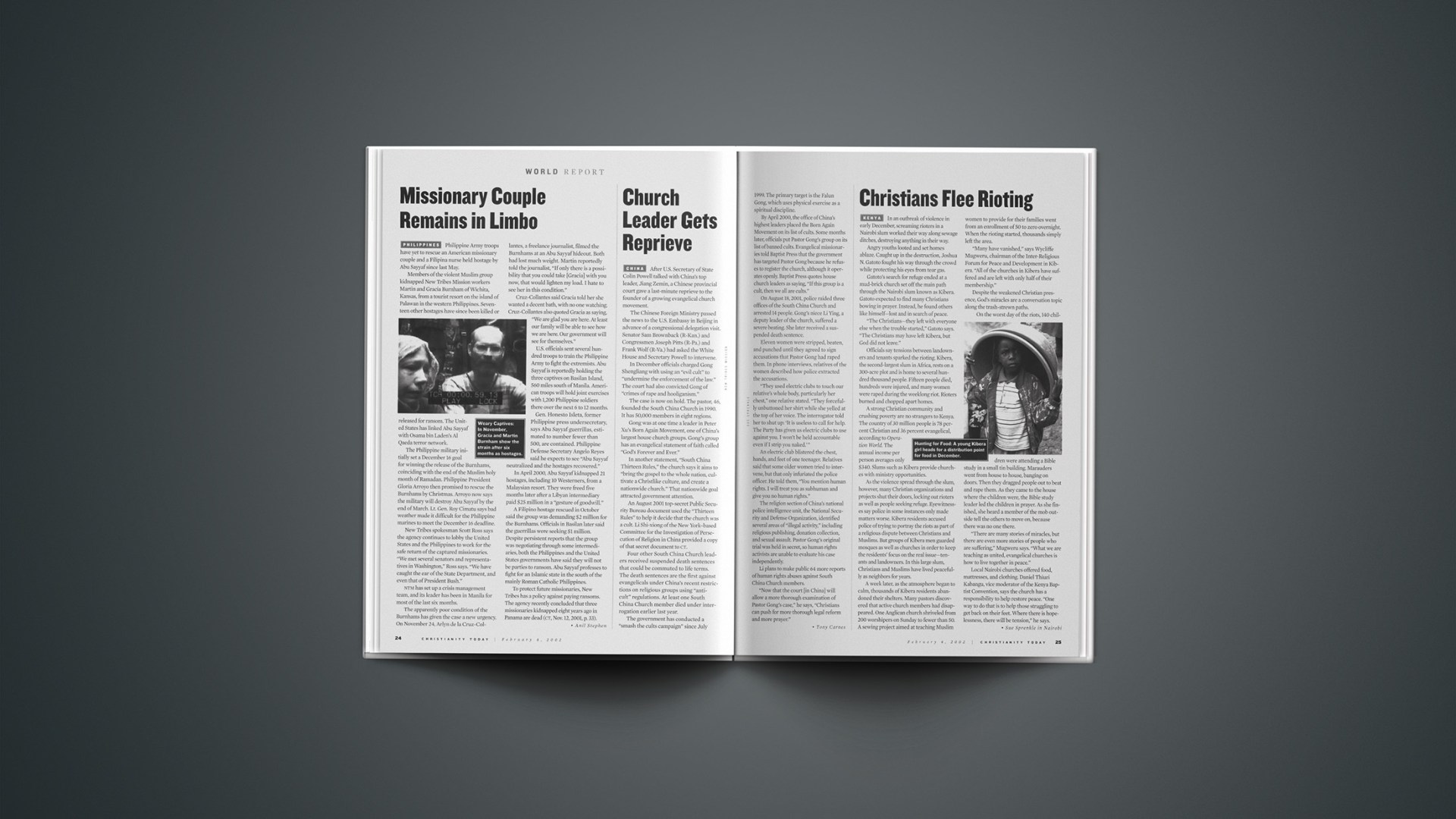In an outbreak of violence in early December, screaming rioters in a Nairobi slum worked their way along sewage ditches, destroying anything in their way.
Angry youths looted and set homes ablaze. Caught up in the destruction, Joshua N. Gatoto fought his way through the crowd while protecting his eyes from tear gas.
Gatoto’s search for refuge ended at a mud-brick church set off the main path through the Nairobi slum known as Kibera. Gatoto expected to find many Christians bowing in prayer. Instead, he found others like himself—lost and in search of peace.
“The Christians—they left with everyone else when the trouble started,” Gatoto says. “The Christians may have left Kibera, but God did not leave.”
Officials say tensions between landowners and tenants sparked the rioting. Kibera, the second-largest slum in Africa, rests on a 300-acre plot and is home to several hundred thousand people. Fifteen people died, hundreds were injured, and many women were raped during the weeklong riot. Rioters burned and chopped apart homes.
A strong Christian community and crushing poverty are no strangers to Kenya. The country of 30 million people is 78 percent Christian and 36 percent evangelical, according to Operation World. The annual income per person averages only $340. Slums such as Kibera provide churches with ministry opportunities.
As the violence spread through the slum, however, many Christian organizations and projects shut their doors, locking out rioters as well as people seeking refuge. Eyewitnesses say police in some instances only made matters worse. Kibera residents accused police of trying to portray the riots as part of a religious dispute between Christians and Muslims. But groups of Kibera men guarded mosques as well as churches in order to keep the residents’ focus on the real issue—tenants and landowners. In this large slum, Christians and Muslims have lived peacefully as neighbors for years.
A week later, as the atmosphere began to calm, thousands of Kibera residents abandoned their shelters. Many pastors discovered that active church members had disappeared. One Anglican church shriveled from 200 worshipers on Sunday to fewer than 50. A sewing project aimed at teaching Muslim women to provide for their families went from an enrollment of 50 to zero overnight. When the rioting started, thousands simply left the area.
“Many have vanished,” says Wycliffe Mugweru, chairman of the Inter-Religious Forum for Peace and Development in Kibera. “All of the churches in Kibera have suffered and are left with only half of their membership.”
Despite the weakened Christian presence, God’s miracles are a conversation topic along the trash-strewn paths.
On the worst day of the riots, 140 children were attending a Bible study in a small tin building. Marauders went from house to house, banging on doors. Then they dragged people out to beat and rape them. As they came to the house where the children were, the Bible study leader led the children in prayer. As she finished, she heard a member of the mob outside tell the others to move on, because there was no one there.
“There are many stories of miracles, but there are even more stories of people who are suffering,” Mugweru says. “What we are teaching as united, evangelical churches is how to live together in peace.”
Local Nairobi churches offered food, mattresses, and clothing. Daniel Thiuri Kabangu, vice moderator of the Kenya Baptist Convention, says the church has a responsibility to help restore peace. “One way to do that is to help those struggling to get back on their feet. Where there is hopelessness, there will be tension,” he says.
Copyright © 2002 Christianity Today. Click for reprint information.
Related Elsewhere
News stories on the rioting includes:
Kibera to be Upgraded — The East African Standard, Nairobi (Dec 19, 2001)
Focus On Clashes in Kibera Slum, Nairobi —UN Integrated Regional Information Networks (Dec 13, 2001)
Churches Support Kibera Landlords — The East African Standard, Nairobi (Dec 13, 2001)
30 People Killed in Fresh Clashes — The Nation, Nairobi (Dec 7, 2001)
Fresh land clashes in Kenya — BBC (Dec 7, 2001)
Hundreds raped’ in Kenya clashes — BBC (Dec 6, 2001)
Thousands flee Nairobi’s biggest slum after riots — The Irish Times (Dec 6, 2001)
Residents Flee Slum in Nairobi After 12 Are Killed in Clashes — The New York Times (Dec 6, 2001)
Thousands Flee Clash — The Nation, Nairobi (Dec 5, 2001)
Death As Violence Erupts in Kibera — The East African Standard, Nairobi (Dec 5, 2001)
Thousands Flee Clash — The Nation, Nairobi (Dec 5, 2001)
Brutal killings in Nairobi slum — BBC (Dec 4, 2001)
For more news articles, see AllAfrica.com or Yahoo’s full coverage.
Christianity Today’s analysis of Africa’s AIDS epidemic in 2000 focused on the Kibera slum. More Christianity Today articles on Africa and Kenya are available in World Report.










